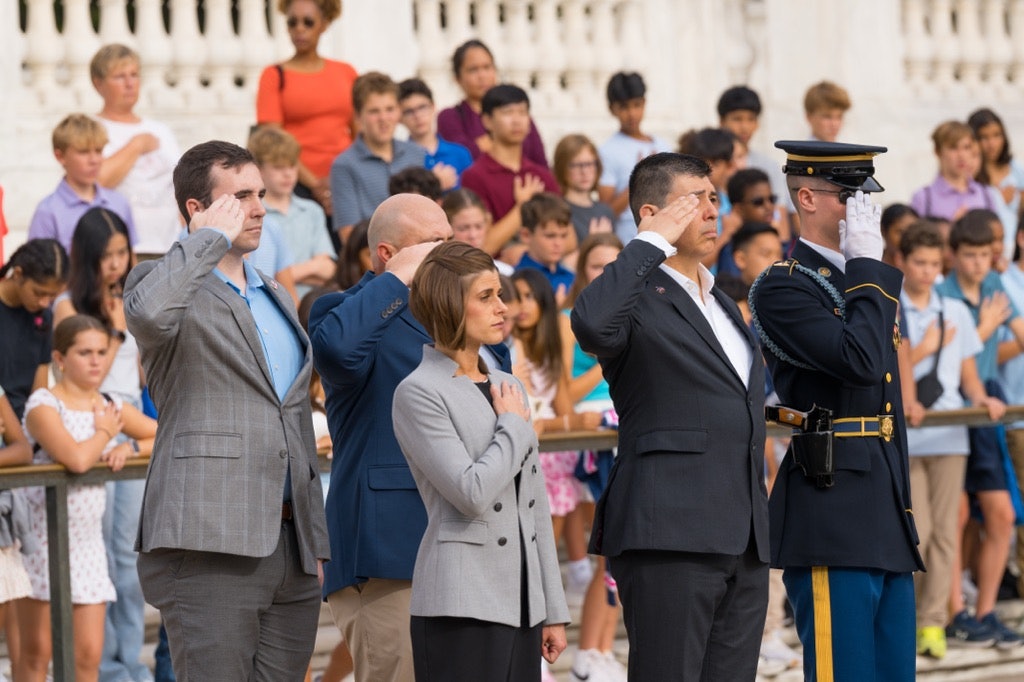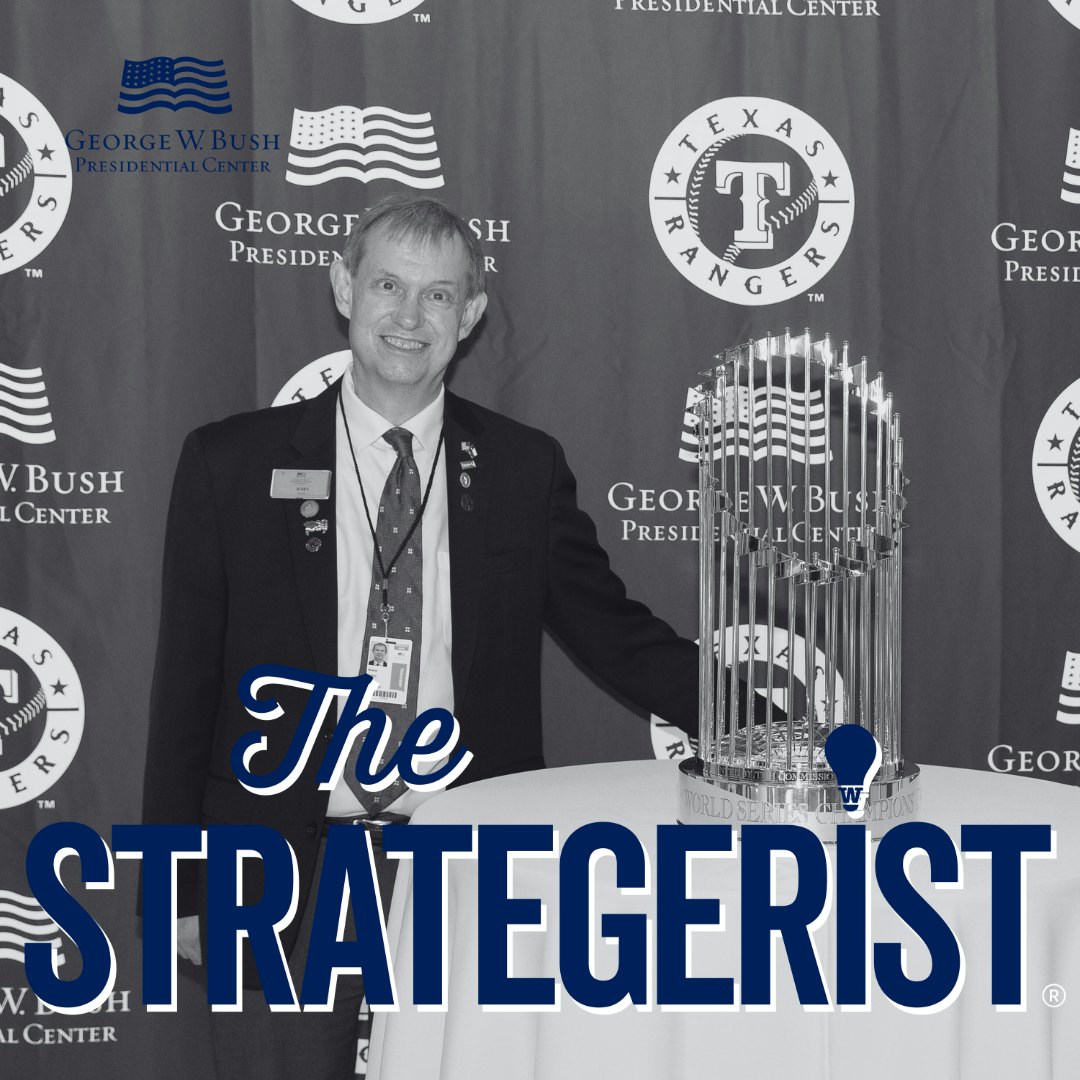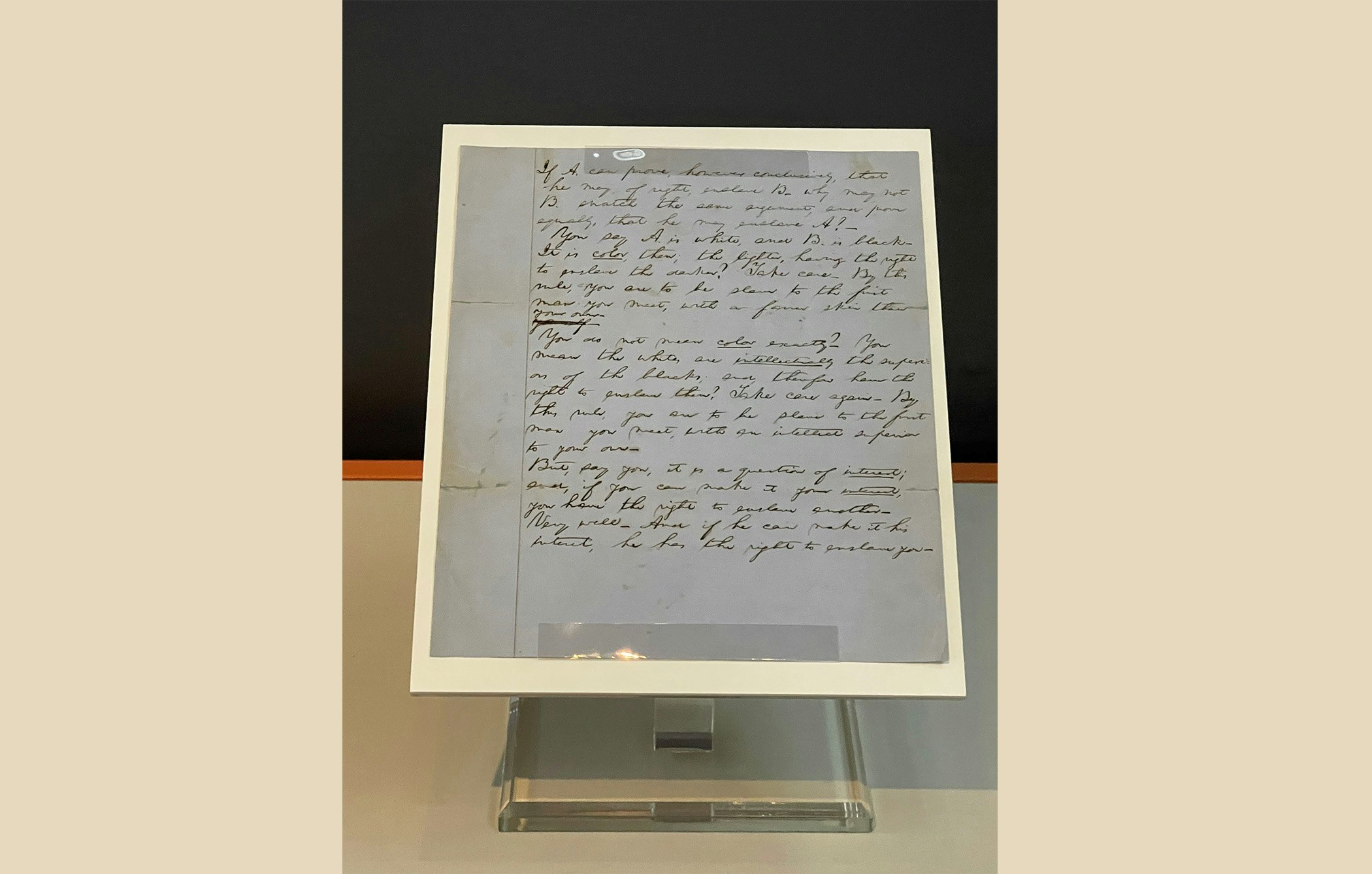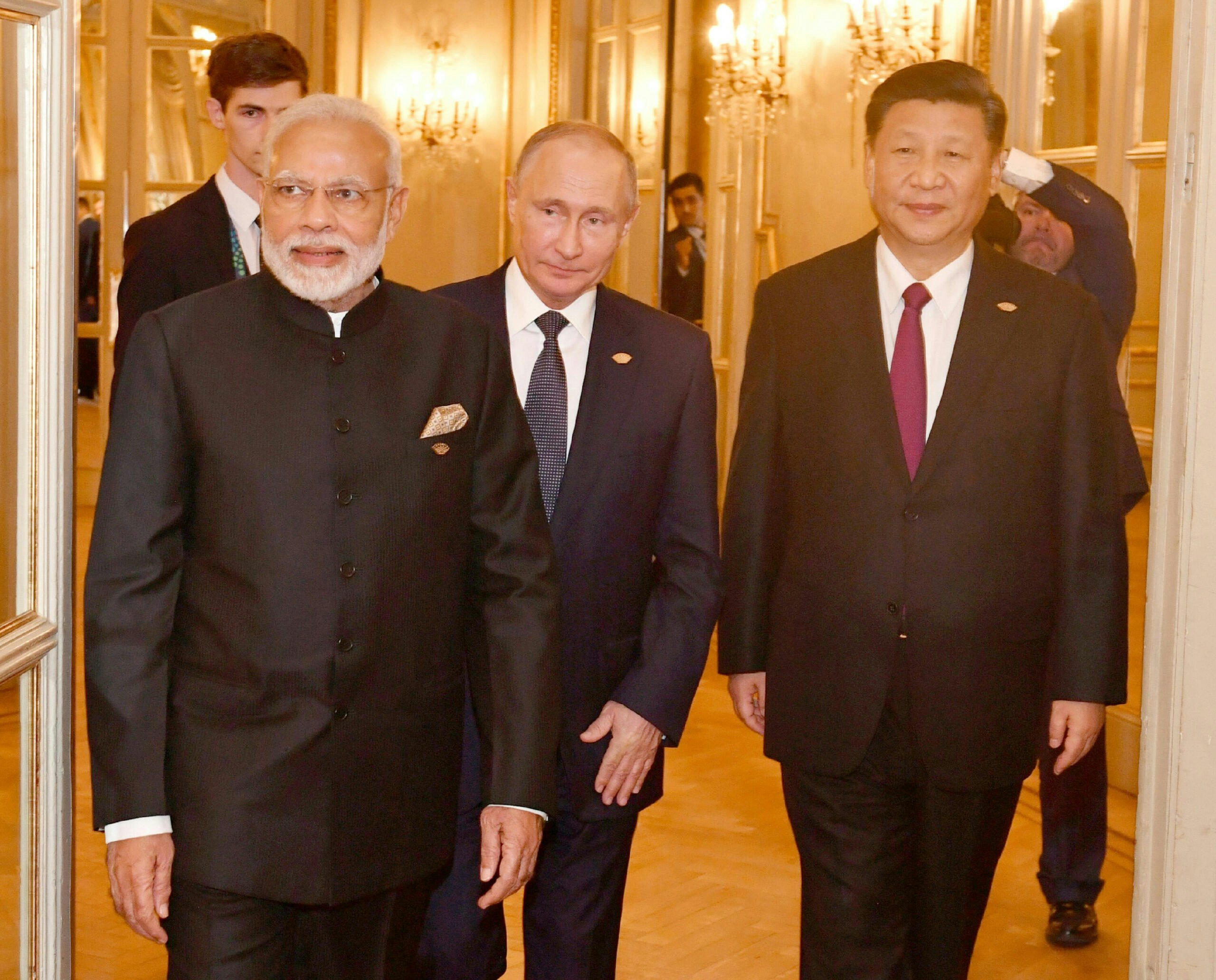We are pleased to be joined this month by Robert “Navy Bob” Roncska, whose decorated Navy career included his service as White House Naval Aide from 2006-08. He is the author of Beyond the Sea: Leading with Love from the Nuclear Navy to the White House and Healthcare, to be published on June 25 with pre-orders available now. The book is filled with stories and leadership lessons from his time at the White House, as commander of the USS Texas nuclear submarine, and his post-Navy work in healthcare. He even tells us how he got the nickname, “Navy Bob” during his time as a member of “Peloton One,” President Bush’s mountain biking group.
Q: What do you mean by “leading with love” and how can your Bush Administration colleagues apply that in their work?
I firmly believe that love is not just a powerful, but an essential tool for effective leadership. While it may seem touchy-feely to some and even make others uncomfortable, the reality is that all of us are born with a fundamental need for love. It involves cultivating genuine and caring relationships with your team. Given that a significant portion of our lives is spent at work, effective leadership profoundly impacts our quality of life and well-being. Leading with love fosters a high-trust environment, as highlighted in the ‘Neuroscience of Trust article’ (Harvard Business Review, 2017), leading to significant benefits:
- 74% less stress
- 106% more energy at work
- 50% higher productivity
- 13% fewer sick days
- 29% more life satisfaction
- 40% less burnout
The book emphasizes three key concepts:
- Leading with Love: Prioritizing empathy, understanding, and compassion in leadership creates a positive work environment that boosts team morale and cooperation.
- Measurable Impact: Research (Leader Member Exchange Theory) statistically demonstrates how leading with love significantly improves productivity, well-being, and job satisfaction, supported by evidence spanning over 50 years.
- Realize True Success: Embracing leading with love transcends material gains or power. It’s about finding fulfillment by serving and assisting others, embodying the essence of a ‘good life.’ Being part of something bigger than yourself.
In Beyond the Sea, I champion leading with love, offering insights and tools from my experiences to assist leaders in transformation, navigating challenges, fostering genuine relationships, and enhancing organizational performance. The book showcases various leadership examples, including instances of President and Mrs. Bush leading with love, demonstrating the correlation between failure and success. Additionally, I provide practical tools for immediate application, empowering everyone to improve their leadership and reach for excellence.
Q: How did you lead with love while commanding a nuclear submarine?
The USS TEXAS (SSN-775), a Nuclear Fast Attack submarine, was significantly underperforming when I assumed command. Problems were addressed punitively, training was lacking, sailors’ professional needs were neglected, and apathy prevailed. I immediately recognized that the root cause of our numerous problems and poor performance was due to the prevailing culture. The crew did not care for the ship because they felt the ship did not care for them. They simply did not feel valued or heard. I changed this culture by leading with love, making it my priority to care for each sailor both personally and professionally.
Immediately, this shift in approach led to noticeable improvements in morale, performance, and culture. We transitioned from being one of the worst-performing submarines in the fleet, almost failing a major engineering inspection just prior to my arrival, to becoming the best-performing submarine out of 10 in the squadron. We achieved the highest retention rate in the Pacific Fleet for two consecutive years and scored the highest possible grade on the Nuclear Engineering Examination that we had previously almost failed two years prior. This transformation was the result of instilling a mindset and foundation of love in leadership. This was the essential ingredient for change.
As Fred Rogers famously said from the beloved children’s show, Mister Rogers’ Neighborhood, “Love and then success, always in that order. It’s that simple and that difficult.” When leaders genuinely care for their teams, the team reciprocates by taking care of the organization, leading to successful mission fulfillment and customer satisfaction. Essentially, love is crucial—it’s not just a nice-to-have but a necessity for the effective and long-term sustainment of success.
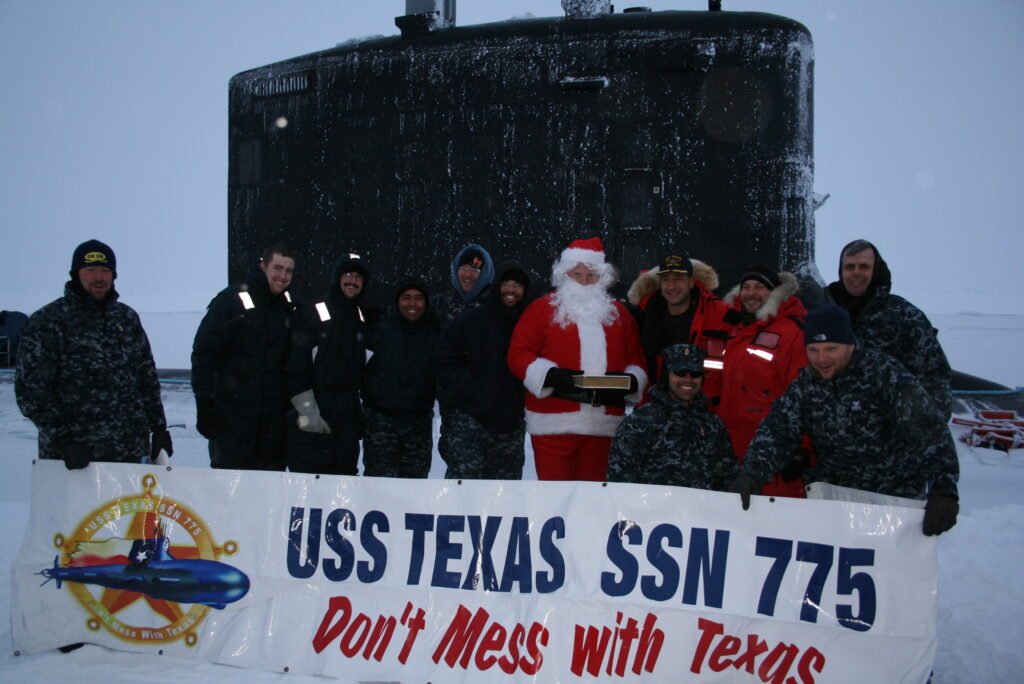
Q: What leadership lessons did you learn from President and Mrs. Bush in your time as a White House Military Aide?
The role of Naval Aide presents a unique opportunity and duty within the Navy, distinct from political appointments. The position’s demands surprised me in ways I hadn’t anticipated, such as the immense responsibility of safeguarding nuclear codes, protecting the President, and the unusually high public visibility. Being selected for this role was a tremendous honor, especially the chance to work for one of the greatest First Families ever to be in office. I consider myself very fortunate, as the Bushes were remarkably kind and supportive. They led with compassion and love, confirming my belief in the most effective leadership style, as detailed in my book with numerous examples.
One such example, discussed in my book, is when we were at the ranch in Crawford during the Iraqi surge, resulting in increased casualties. Every morning at the ranch, I would receive a one-page summary of world events from the Situation Room. At the top of the page, it always indicated the number of lost service members. At 0500 every morning, like clockwork, the house light would come on, and President Bush would start the coffee pot. That was my cue to approach the house with the report. As soon as he saw me, he would ask, “How did we do last night?” I knew exactly what he meant—he was asking if we lost anyone. If I told him, “Mr. President, we didn’t lose anyone,” his mood would brighten, and he would start making plans for the day’s tasks or a bike ride. Then I would give him a synopsis of the rest of the report. But if I had to report the loss of service members, his face would fall. He’d thank me quietly, take the papers, and retreat into the house. It was apparent that he deeply cared for all those who served and felt the pain of their loss. It impressed me greatly that he cared so deeply for others. There was no press or political show—this was genuine love for those he commanded as Commander in Chief. There was no doubt this was leading with love.
I also learned incredible examples of leading with love from the entire staff supporting President Bush, Mrs. Bush, and Vice President Cheney. They embodied a “field of dreams” model, building a great culture where top-notch people from across our nation came to selflessly serve. I was in awe of the talent and camaraderie of those I worked with on the Bush/Cheney staff, and I was honored to be part of this family and magical culture.
Q: From your MilAide days, I’m sure you get asked often about carrying the “football” with the nuclear codes. In your book you detail how the job was much bigger than that. What would you like people to better understand about the role of White House Military Aide?
Carrying the nuclear codes (commonly referred to as the “football”) is only a small portion of the responsibilities of being the Presidential Military Aide. The book contains some great stories about these other duties. One such duty is assisting in awarding the Medal of Honor to our national heroes, such as the posthumous award given to Lt. Michael Murphy’s parents. Other responsibilities include coordinating all military assets (Air Force One, Marine One, the White House Medical Unit, White House Mess and the White House Communications Agency, for example) during the President’s trips to ensure his safety and well-being in the event of a crisis and acting as a personal aide during his limited respite times at Kennebunkport, Camp David, or the ranch. Everyone who was part of their staff played an incredible role and contributed to the overall success of the office of the presidency and national security. It was easy to want to do this because he and Mrs. Bush made you feel valued and cared for.
Q: You were also a member of Peloton One – the group that rode mountain bikes with President Bush. Can you leave us with a favorite story from the trail?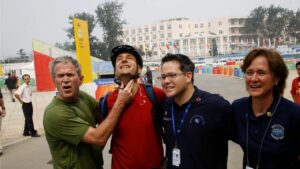
The photo to the right is from the 2008 Beijing Olympics captures a moment when I experienced a minor injury on the Olympic Mountain Bike Course. Instead of brushing it off despite his busy schedule, President Bush showed genuine concern and we shared a lighthearted moment over the incident. This perfectly illustrates how much he led with love, cared for the well-being of those who worked for him, and served others.
BONUS QUESTION: What’s the story behind being called, “Navy Bob?”
One day shortly after I reported to the White House, Jared Weinstein, the personal aide at the time, asked if anyone could help with bike trail maintenance over the weekend at President Bush’s local riding spot – the Secret Service training camp in Beltsville, Maryland. Eager to support his passion for biking, I volunteered. On the drive home, Jared called President Bush to update him on the day’s activities and the progress of the bike trail maintenance. During the call, the President asked who had helped. Jared listed the names and finished with mine. Unfamiliar with me since I had just arrived, President Bush asked, “Bob who?” Jared replied, “You know, Navy Bob.” From that day on, I was affectionately known as “Navy Bob.”



